Choosing the right keyword research tool can make or break your SEO strategy. For 2025, we’ve compared 12 popular tools based on their features, pricing, and usability. Whether you’re a beginner, small business, or an enterprise, there’s a tool for you. Here's a snapshot:
- SEMrush ($117.33/month): Best for advanced competitor analysis with a massive keyword database.
- Ahrefs ($119/month): Ideal for backlink analysis and uncovering traffic potential.
- Google Keyword Planner (Free): Reliable for basic keyword insights straight from Google.
- Ubersuggest ($29/month): Beginner-friendly with content planning features.
- Moz Keyword Explorer ($99/month): Great for precise keyword difficulty scoring.
- Soovle (Free): Quick keyword suggestions from multiple platforms like Google, YouTube, and Amazon.
- KWFinder ($29/month): Focuses on simplicity and finding low-competition keywords.
- Jaaxy ($49/month): Niche-focused with unique competition metrics.
- Backlinko’s Keyword Tool (Free with SEMrush integration): Simplifies research for beginners.
- Topic Ranker (Free): AI-powered tool for identifying under-optimized SERPs.
- Keyword Tool Dominator (Freemium): Finds platform-specific keywords for Google, Amazon, and YouTube.
- DataForSEO (Pay-as-you-go): API-driven for developers and large-scale SEO operations.
Quick Comparison Table
| Tool Name | Key Features | Best For | Starting Price |
|---|---|---|---|
| SEMrush | Competitor analysis, keyword gaps | Enterprise SEO teams | $117.33/month |
| Ahrefs | Backlink insights, traffic potential | Professional SEOs | $119/month |
| Google Keyword Planner | Basic keyword data, free access | PPC advertisers | Free |
| Ubersuggest | Content ideas, SEO difficulty scores | Small businesses | $29/month |
| Moz Keyword Explorer | Priority scoring, SERP analysis | Mid-level marketers | $99/month |
| Soovle | Multi-platform suggestions | Quick brainstorming | Free |
| KWFinder | Long-tail keywords, ease of use | Budget-conscious users | $29/month |
| Jaaxy | Competition metrics, niche targeting | Affiliate marketers | $49/month |
| Backlinko’s Tool | SEMrush-powered insights | SEO beginners | Free (with limits) |
| Topic Ranker | AI-driven SERP analysis | Content creators | Free |
| Keyword Tool Dominator | Multi-platform keyword search | Local SEO specialists | Freemium |
| DataForSEO | API-driven, scalable data | Developers, enterprises | Pay-as-you-go |
These tools cater to different needs, from finding long-tail keywords to analyzing competition. Whether you’re just starting or need advanced insights, this list has you covered. Let’s dive into the details of each tool.
Testing SAME Keywords on the Best SEO Tools of 2024
1. SEMrush Overview

SEMrush is a keyword research tool priced at $117.33/month for its base plan. It boasts a database of over 25 billion terms and offers extensive SEO tools through its Keyword Magic Tool and Organic Research Reports. Designed for professional marketers and SEO experts, SEMrush provides in-depth keyword analysis features.
With SEMrush, you get detailed keyword insights like search volume, keyword difficulty, and cost-per-click data. One standout feature is the Keyword Gap tool, which lets you compare up to five competitors at once - perfect for competitive analysis.
| Feature Category | Capabilities |
|---|---|
| Keyword Research | Keyword Magic Tool, Long-tail variations, Difficulty analysis |
| Competitor Analysis | Keyword Gap tool, Organic research reports |
| Technical SEO | Site audits, On-page optimization, SERP feature tracking |
| Integration | Google Analytics and Google Search Console compatibility |
The platform's AI-powered keyword suggestions are especially helpful for niche content. For example, when researching long-tail keywords like "keto diet meal plan", SEMrush provides metrics on search intent and ranking difficulty, helping you plan content more strategically.
One major advantage is its integration with Google's ecosystem. By linking Google Analytics and Search Console, users can directly connect keyword data to traffic results, offering a clearer picture of performance.
That said, SEMrush's advanced features might feel overwhelming for new users. While it offers a freemium model for basic tools, unlocking its full potential requires a paid subscription. This makes it a better fit for established businesses and SEO professionals rather than beginners or small startups.
"SEMrush is my favorite keyword research tool", says Brian Dean of Backlinko. He emphasizes its "extensive database and AI-powered keyword suggestions" as key features that make it an essential tool for effective SEO strategies.
If you're looking for a data-driven platform with powerful tools, SEMrush is hard to beat. Up next, let’s see how Ahrefs stacks up in the keyword research game.
2. Ahrefs Overview

Ahrefs, starting at $119/month, provides a powerful set of SEO tools, with its Keywords Explorer standing out thanks to a large, frequently updated database that reflects current search trends and Google algorithm shifts.
What makes Ahrefs unique is how it combines keyword research with strong backlink analysis. When diving into keywords, users gain access to detailed metrics such as:
| Metric Type | Data Provided |
|---|---|
| Keyword Intelligence | Search volume, difficulty score, click metrics |
| SERP Analysis | Position history, featured snippet opportunities |
| Content Insights | Traffic potential, keyword ideas, parent topics |
| Competition Data | Backlink profiles, domain ratings, keyword gaps |
The Content Explorer feature highlights content that drives the most organic traffic and backlinks. For example, it can reveal successful formats for topics like "content marketing strategy."
By integrating with Google Search Console, Ahrefs allows users to track keyword rankings and compare them with competitors. This is especially helpful for B2B marketers managing multiple keywords across various regions.
While the tool offers extensive data, its interface can be a bit challenging for beginners. However, for users needing in-depth competitive insights, it’s a solid choice.
"Ahrefs is mostly known for backlink analysis. But I have to say: it's got a killer keyword research tool", says Brian Dean, Founder of Backlinko, emphasizing its growth from a backlink checker to a full SEO platform.
One standout feature is its ability to uncover low-competition keywords with high traffic potential. Instead of just focusing on search volume, Ahrefs estimates "traffic potential", which predicts total traffic from ranking for a keyword and related searches.
Additionally, the platform includes webmaster tools for technical SEO analysis. While the cost might be steep for smaller businesses, the depth of data and insights makes it a worthwhile investment for those serious about improving their SEO performance.
Although Ahrefs shines in backlink analysis and content insights, SEMrush offers tighter integration with Google's tools, making it a better fit for users looking for broader SEO capabilities. Up next, we’ll examine how Google Keyword Planner stacks up as a free option for keyword research.
3. Google Keyword Planner Overview
Google Keyword Planner is accessible to anyone with an active Google Ads account, offering keyword insights straight from Google's search data. For content creators and small businesses, this means reliable keyword data without extra costs. Its user-friendly design makes it a great starting point for beginners exploring SEO.
The tool stands out for providing accurate search volume data and competition metrics directly from Google's database.
| Feature Category | Capabilities |
|---|---|
| Keyword Discovery | Search volume trends, related keyword suggestions |
| Competition Analysis | Competition level indicators, CPC estimates |
| Data Filtering | Volume-based filtering, location targeting |
| Campaign Planning | Keyword grouping, budget forecasting |
By integrating with Google Ads, the tool allows users to assess both organic and paid keyword opportunities in one place. However, search volume data is presented in broad ranges, making it less precise compared to some paid tools.
One of its strengths is identifying low-competition, long-tail keywords at no cost, which is especially helpful for newer websites competing in tough niches.
"Google Keyword Planner remains the go-to tool for initial keyword research due to its direct access to Google's data. While it may lack some advanced features, its accuracy in search volume trends makes it invaluable for both SEO and PPC planning", says Neil Patel, a well-known digital marketing expert.
The tool also stands out for analyzing seasonal trends and year-over-year keyword popularity changes, which can help with planning content calendars. However, it doesn't include advanced metrics like keyword difficulty or backlink analysis, so pairing it with other tools might be necessary.
Its local SEO capabilities allow users to evaluate keyword performance by region, making it a useful resource for location-specific strategies.
While Google Keyword Planner is simple and budget-friendly, tools like Ubersuggest expand on its features by offering more detailed metrics and advanced options.
4. Ubersuggest Overview

Ubersuggest sits comfortably between basic free tools and high-end enterprise platforms, offering a user-friendly interface and generating keyword suggestions using Google's autocomplete feature.
| Feature Category | Capabilities |
|---|---|
| Keyword Analysis | Search volume, SEO difficulty, CPC data |
| Content Planning | Topic suggestions, content ideas generator |
| Site Auditing | Technical SEO analysis, competitor tracking |
| Data Integration | Google Trends sync, multi-search engine data |
The tool operates on a freemium model. Its free version provides basic keyword research, while the paid version ($29/month) unlocks advanced features like unlimited keyword suggestions and competitor analysis. The content ideas generator is particularly useful, offering topic suggestions based on keyword trends and search intent to help craft content strategies that resonate with your audience.
One standout feature is Ubersuggest's integration with Google Trends, delivering up-to-date insights into keyword popularity. Compared to Google Keyword Planner, it offers more detailed metrics and advanced filtering options. However, its data updates aren't as frequent as premium tools like SEMrush or Ahrefs. Still, its approach to keyword research and analysis is thorough enough for most users.
The platform's site audit tool goes beyond keyword research, analyzing technical SEO factors to streamline content optimization. It simplifies complex SEO concepts, making it a great choice for users moving up from basic tools.
Ubersuggest's mix of features and accessibility makes it a solid choice for beginners and intermediate users looking to scale their content strategies. That said, the limitations of the free version may push growing businesses to consider upgrading for deeper insights.
Now, let’s explore how Moz Keyword Explorer caters to users seeking more advanced SEO tools.
5. Moz Keyword Explorer Overview
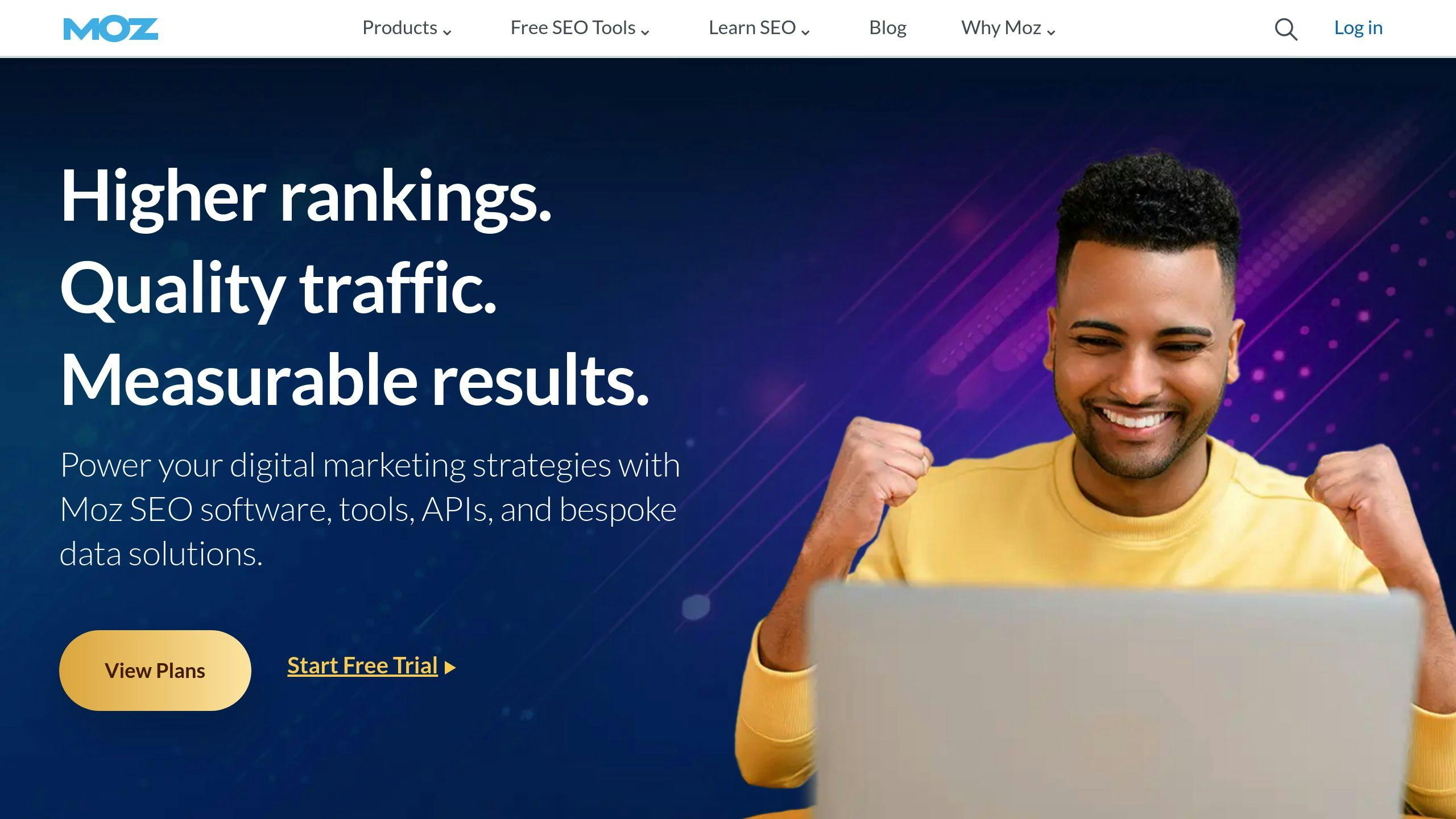
Moz Keyword Explorer is a powerful tool for SEO experts and content strategists, starting at $99 per month for the Standard plan. One of its standout features is the precise keyword difficulty scoring system, which helps users decide which keywords to target with confidence.
The tool's Priority Score combines search volume, keyword difficulty, and organic click-through rate to highlight the best keyword opportunities. Unlike competitors like SEMrush and Ahrefs, which focus more on raw data, Moz takes a unified approach to keyword evaluation, simplifying the process of prioritizing content ideas.
| Feature Category | Capabilities |
|---|---|
| Core Research | Search volume tracking, keyword suggestions, SERP analysis |
| Competitive Analysis | Domain authority metrics, competitor keyword gaps |
| Content Planning | Priority score, organic CTR metrics, keyword grouping |
| Data Integration | Works seamlessly with the Moz Pro suite |
One of the tool's biggest advantages is its integration with the Moz Pro suite. This allows users to move effortlessly between keyword research, site audits, and rank tracking, all within one platform. The keyword database supports global SEO efforts, offering data from over 200 countries and in multiple languages, making it suitable for markets across North America, Europe, and Asia-Pacific.
Advanced filtering options make detailed keyword analysis easier, while the SERP analysis feature provides a deep dive into competing pages, helping users understand what’s needed to rank for specific terms. Although the interface might seem overwhelming at first, Moz provides thorough documentation to help users get up to speed.
While Moz focuses on in-depth analytics and decision-making tools, Soovle offers a simpler approach by pulling keyword suggestions from various search engines.
6. Soovle Overview
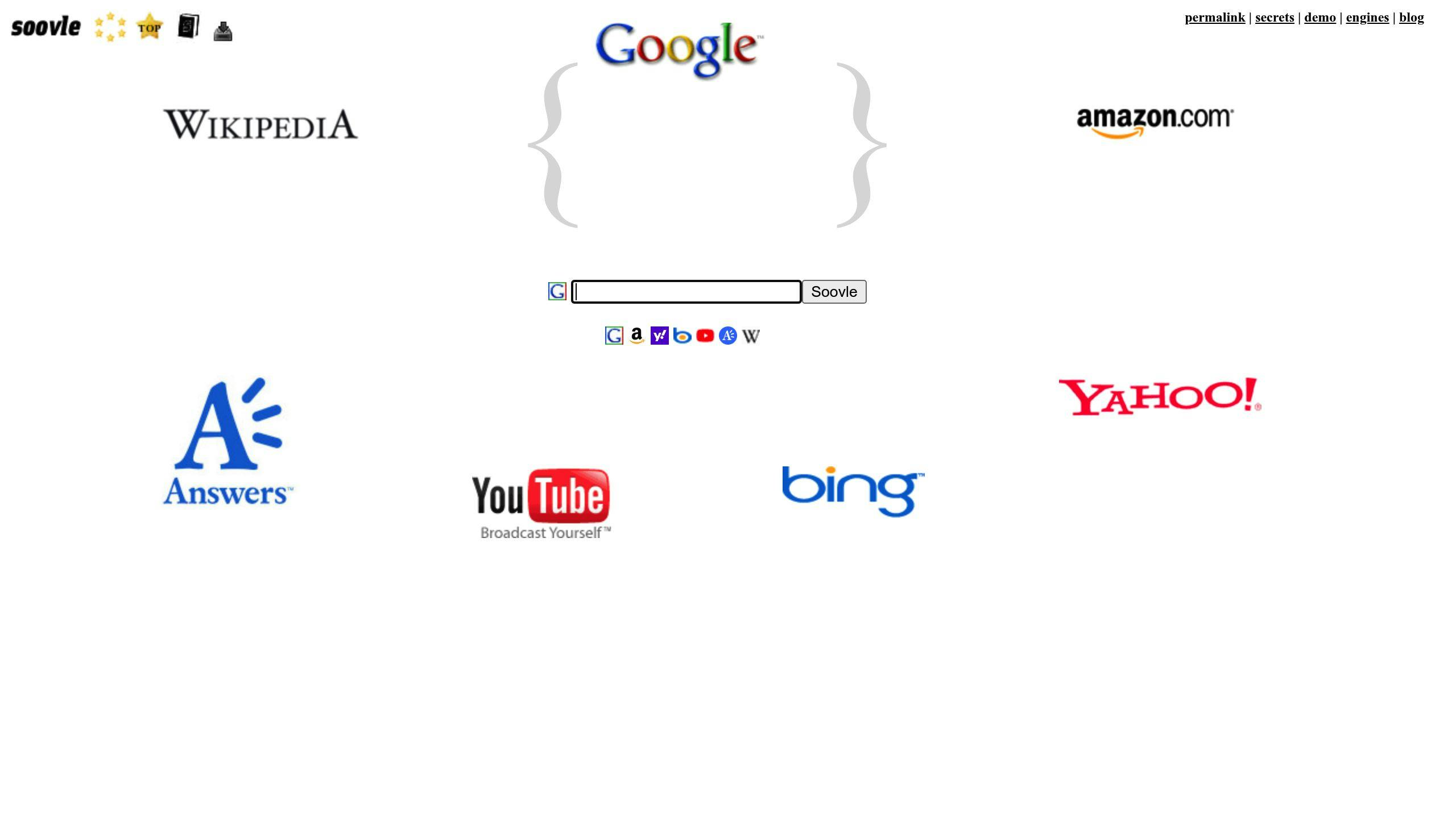
Soovle is a free tool that pulls keyword suggestions from platforms like Google, YouTube, Bing, and Amazon. It's especially useful for finding keywords that others might miss, making it a great choice for e-commerce businesses working across multiple marketplaces. Brian Dean from Backlinko describes it perfectly:
"Soovle gives you suggested keyword ideas from Google, YouTube, Bing, Yahoo, Amazon and more. That way, you can find untapped keywords that your competition doesn't know about."
| Feature Category | Capabilities |
|---|---|
| Data Sources | Google, YouTube, Bing, Yahoo, Amazon, eBay |
| Core Features | Multi-platform keyword suggestions, bulk export options |
| Geographic Coverage | Country-specific search volume data |
| Cost | Free with unlimited searches |
| Integration | Works with major search engines and e-commerce platforms |
The tool's simple and user-friendly interface makes it ideal for beginners who need quick keyword ideas across multiple platforms. Its drag-and-drop feature also makes organizing keywords a breeze. While it doesn’t offer the deep analysis of paid tools, Soovle stands out by providing country-specific search volume data from sources like Amazon and YouTube.
Soovle is perfect for brainstorming content ideas, especially for long-tail keywords that traditional tools might miss. With unlimited searches and bulk export functionality, it’s a handy option for content creators.
Although Soovle shines with its simplicity and multi-platform reach, tools like KWFinder offer more advanced filtering and features for those needing a deeper dive into keyword research.
sbb-itb-5be333f
7. KWFinder Overview
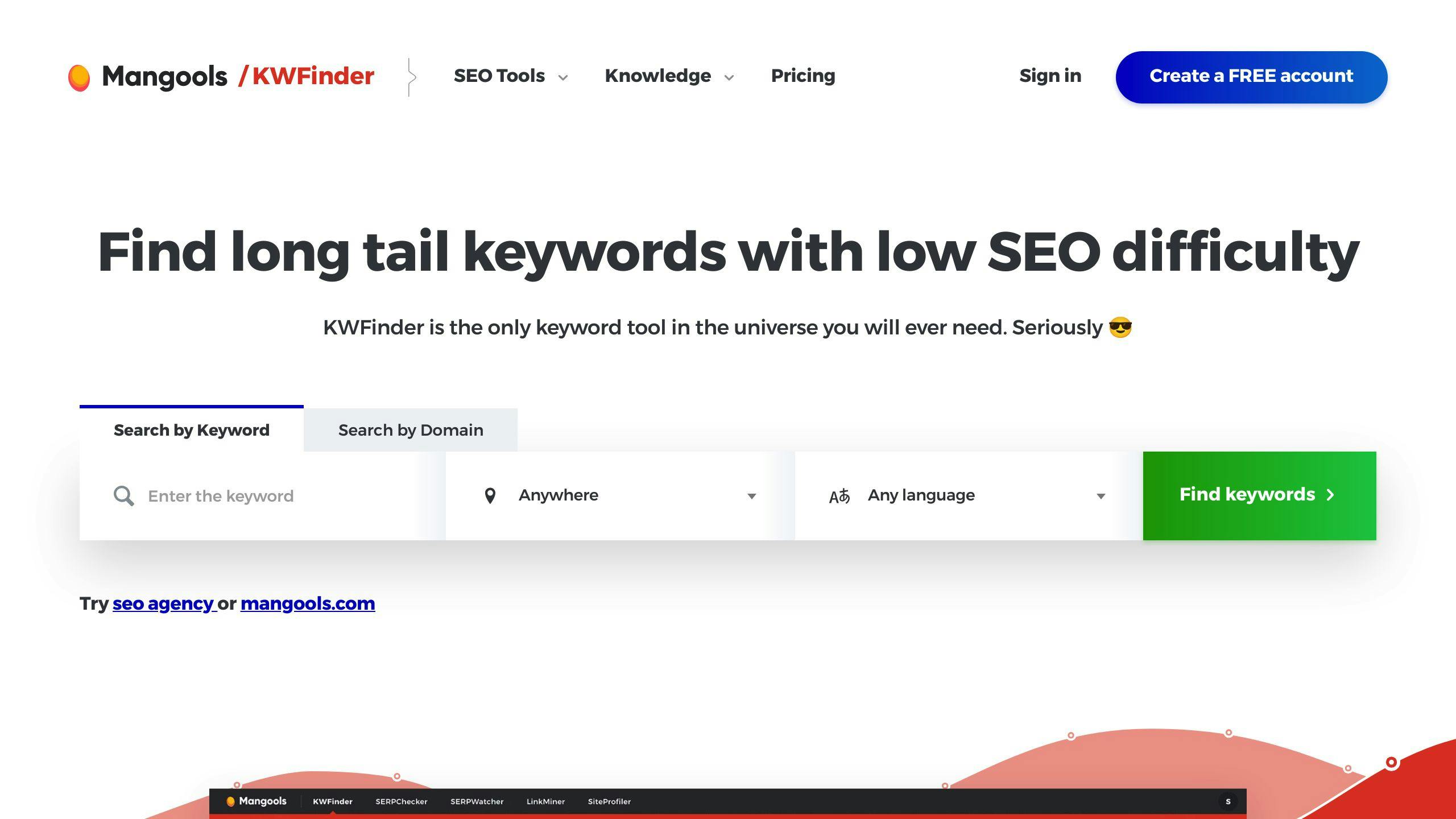
KWFinder offers a straightforward and detailed approach to keyword research, designed to simplify SEO strategies. Unlike tools like SEMrush and Ahrefs, which can feel overwhelming with their extensive features, KWFinder focuses on delivering the essentials in a user-friendly way.
One of its standout features is the keyword difficulty score, which uses a 0-100 scale to help users pinpoint low-competition keywords that offer realistic ranking opportunities. Another key feature is its SERP analysis, which provides in-depth data on the top 10 ranking pages, including metrics like domain authority, page authority, and backlink profiles. These insights are invaluable for tailoring SEO efforts to match your current capabilities.
| Feature Category | Capabilities |
|---|---|
| Core Features | Long-tail keyword suggestions, SERP analysis, competitor insights |
| Data Accuracy | Real-time search volume data, trend analysis |
| Difficulty Score | 0-100 scale with visual indicators |
| Geographic Coverage | 200+ countries supported |
| Price Range | Starting at $29/month, free plan available |
KWFinder also integrates with Google Trends, providing extra context on seasonal keyword variations and long-term trends. It's especially effective for finding long-tail keywords, which often have less competition and higher conversion potential.
"KWFinder has become an essential tool for businesses looking to compete in less crowded keyword spaces. Its difficulty score has proven remarkably accurate in predicting ranking potential", says SEO expert Craig Campbell.
The platform’s intuitive design allows users to filter keywords by metrics like search volume, difficulty, and CPC, making both quick and in-depth research easier. While it doesn’t offer the extensive features of enterprise tools like SEMrush, its simplicity is ideal for small to medium-sized businesses and content creators who need reliable keyword data without the added complexity.
Additionally, KWFinder provides search volume data specific to over 200 countries and pairs it with difficulty scores, making it a great choice for businesses planning global SEO strategies. Its competitive pricing and focus on usability make it a strong option for those looking to expand their digital reach.
8. Jaaxy Overview
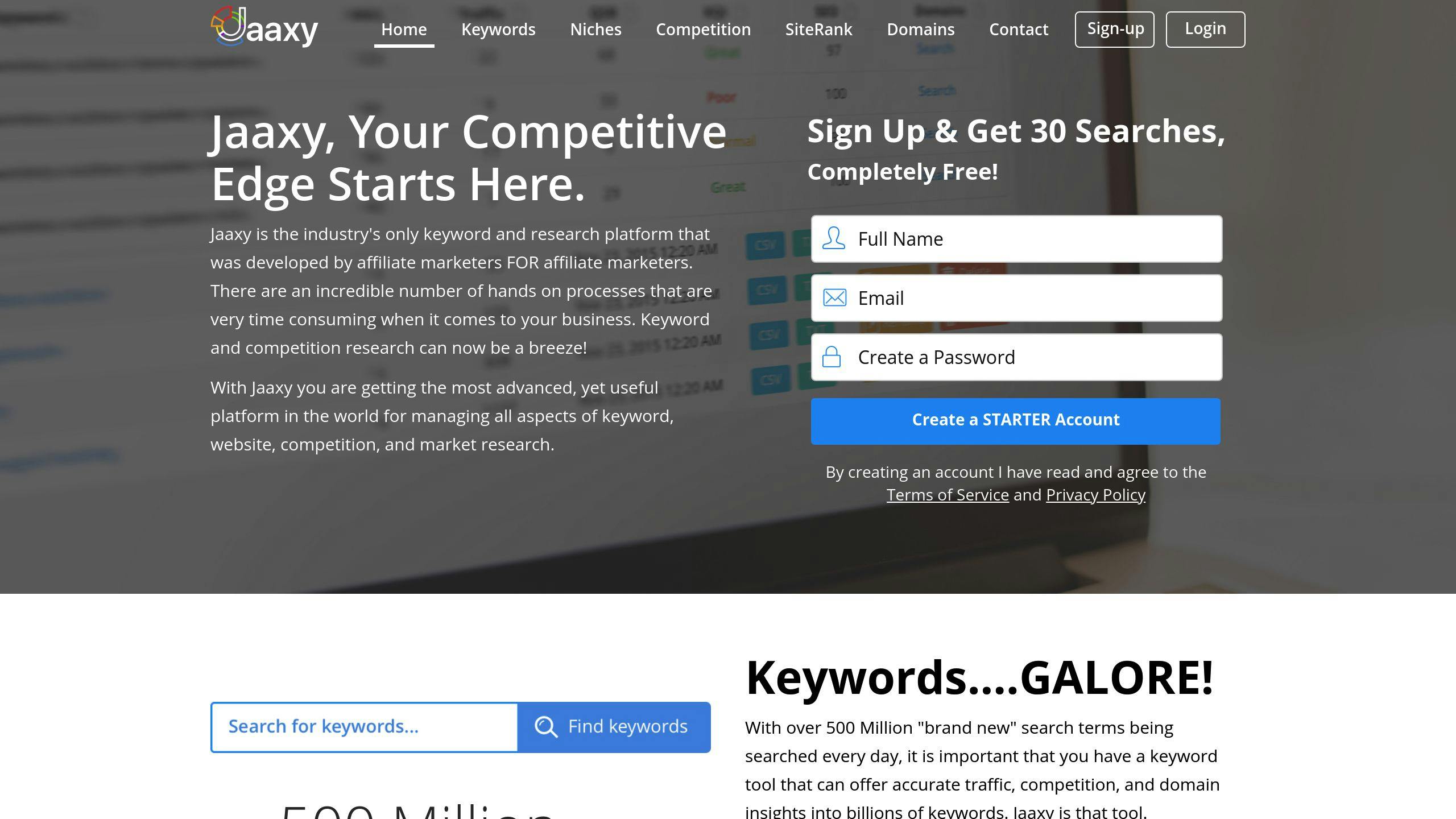
Jaaxy stands out with its Quote Search Results (QSR) metric, which shows the exact number of competing websites for a specific keyword. Unlike traditional keyword difficulty scores, QSR zeroes in on the actual number of competing pages, providing detailed insights that are especially useful for niche targeting. This tool is tailored for bloggers and niche content creators.
The platform's user-friendly interface focuses on delivering essential keyword data without unnecessary clutter. Its keyword quality indicator combines search volume, competition levels, and traffic potential to give users a quick assessment of a keyword's ranking potential. This makes it easier to decide which terms to target.
| Feature Category | Capabilities |
|---|---|
| Core Features | Keyword suggestions, QSR analysis, traffic predictions |
| Search Analysis | Long-tail keyword discovery, competition metrics |
| Data Coverage | Search volume, CPC data, keyword quality scoring |
| Trial Option | 30 free keyword searches |
| Price Point | $49/month for full access |
Jaaxy is particularly effective for finding niche long-tail keywords, thanks to its QSR metric. This makes it a strong choice for targeting less competitive markets. While it doesn't offer the extensive feature set of tools like SEMrush or Ahrefs, its simplicity and focus make it a great option for small to medium-sized businesses looking for straightforward keyword insights.
"Jaaxy's strength lies in its ability to quickly identify profitable keyword opportunities through its unique QSR system, making it especially valuable for niche website owners and content marketers", says SEO expert Kyle Roof.
Jaaxy provides a free trial with 30 keyword searches, and full access is available for $49/month. This makes it an excellent option for users who want focused keyword data without the added complexity of larger tools. Its ability to predict traffic from ranking keywords helps streamline content planning and SEO strategies.
While Jaaxy is perfect for users seeking simplicity and niche-focused metrics, the next tool, Backlinko's Keyword Tool, offers a broader range of features for those looking for a more advanced approach.
9. Backlinko's Keyword Tool Overview
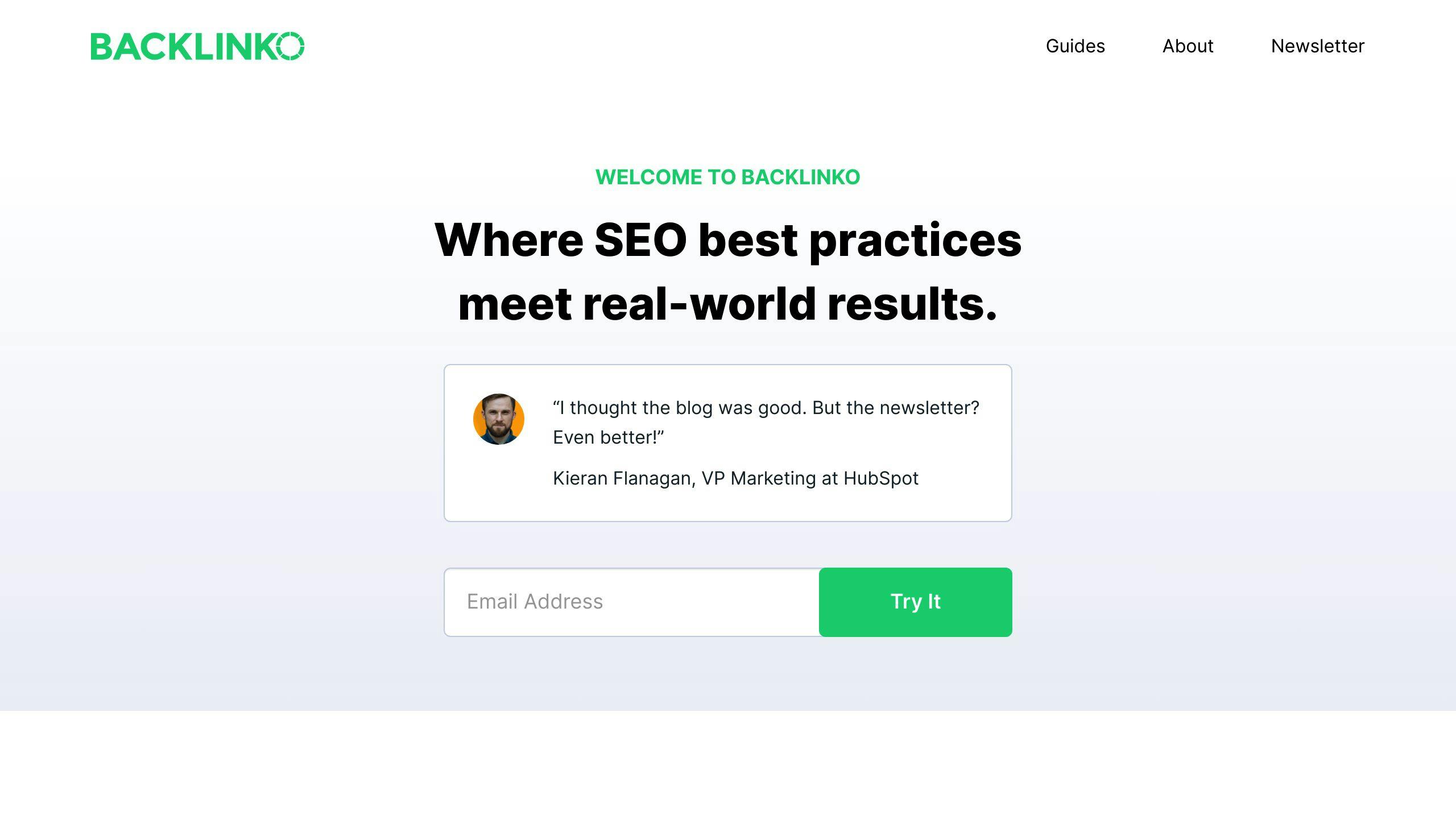
Backlinko's Keyword Tool combines ease of use with detailed insights, thanks to its connection to SEMrush's extensive database. The free version offers 15 keyword suggestions, while full access provides deeper metrics like search volume, keyword difficulty, and search trends through SEMrush.
Its straightforward interface makes it a great option for SEO beginners and small businesses. The tool helps simplify keyword research by pinpointing opportunities in less crowded niches and offering seasonal trend data to assist with content planning.
| Feature Category | Capabilities |
|---|---|
| Basic Features | Keyword suggestions, search volume, trend data |
| Advanced Features | Keyword difficulty, competitive analysis (via SEMrush) |
| Data Integration | Access to SEMrush's database |
| Free Version | Basic keyword research tools |
| Full Access | Requires SEMrush subscription ($117.33/month) |
What makes this tool stand out is its connection to SEMrush, which lets users start with basic research and expand as their needs grow. It’s especially effective for finding long-tail keywords and evaluating their competition.
"The integration with SEMrush's database gives Backlinko's Keyword Tool a significant advantage in terms of data accuracy and depth. It's particularly effective for businesses that want to start with basic keyword research and scale up their efforts over time", says Brian Dean, founder of Backlinko.
To unlock full access, you'll need a SEMrush subscription. This positions Backlinko's Keyword Tool as a strong companion to SEMrush's broader SEO tools rather than a standalone solution.
While Backlinko's Keyword Tool shines with its SEMrush integration for detailed research, Topic Ranker focuses more on building topical authority and creating content clusters.
10. Topic Ranker Overview
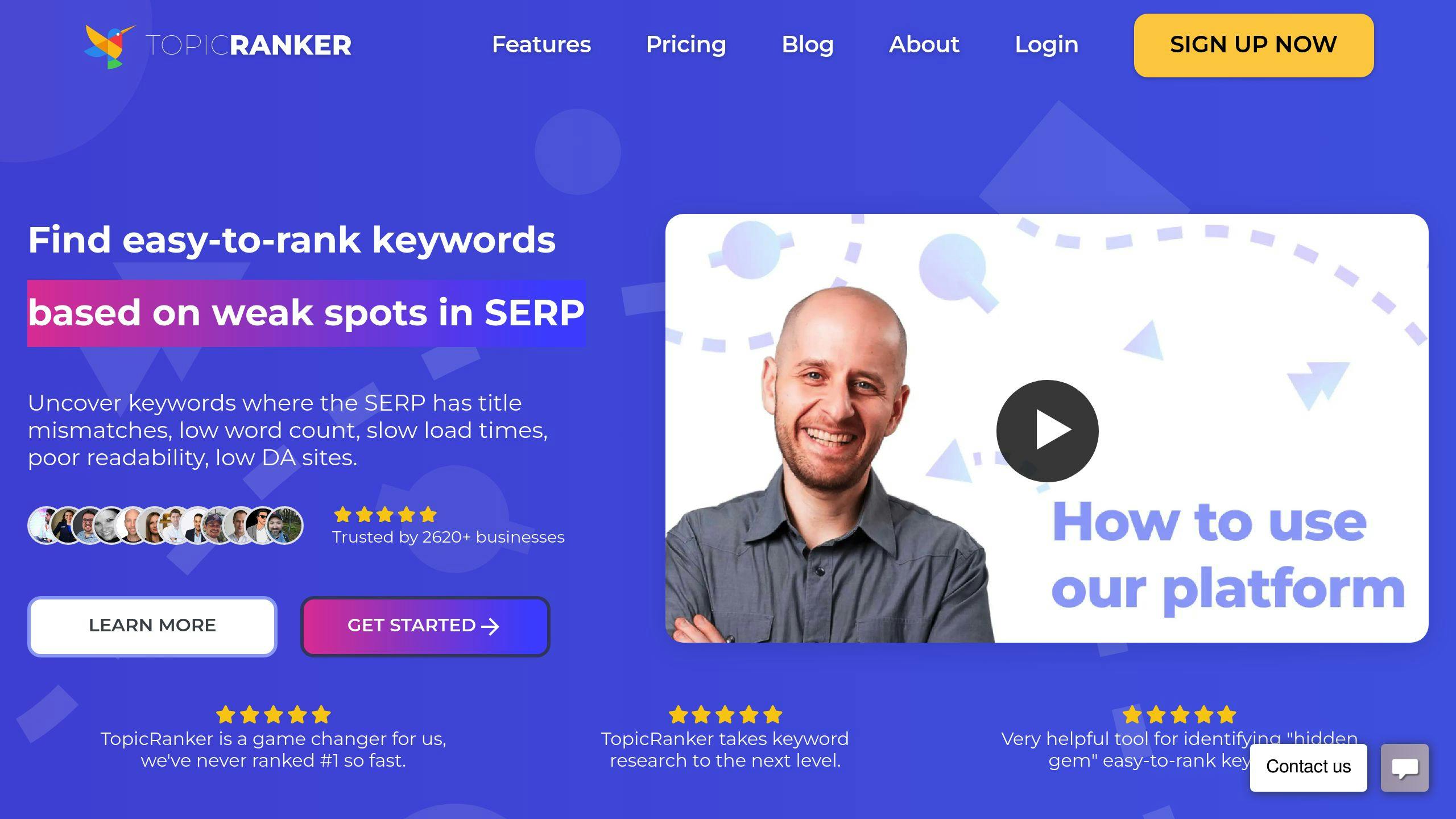
Topic Ranker is a go-to option for digital marketers working with tight budgets. It delivers quick insights for content optimization and stands out as a free, AI-powered tool.
This tool uses AI to analyze SERPs (Search Engine Results Pages), uncover keyword opportunities, and offer on-page optimization tips. It eliminates the hassle of manual research and focuses on SERPs where ranking improvements are most achievable - setting it apart from traditional keyword research tools.
| Feature Category | Capabilities |
|---|---|
| Core Functions | SERP analysis, AI keyword suggestions, content optimization |
| Target Users | Digital marketers, content creators |
| Pricing | Free |
| Key Benefits | Automated analysis, time-saving recommendations |
| Optimization Focus | Under-optimized SERP opportunities |
"Topic Ranker's AI-driven approach represents a significant shift in how we approach keyword research", says a seasoned digital marketing expert.
One limitation is its lack of integration with other SEO tools, which may require users to juggle multiple platforms for a complete SEO strategy. Even so, its no-cost model and targeted focus make it a practical choice for pinpointing ranking opportunities.
For content creators looking to boost SEO results without spending on pricey tools, Topic Ranker is a helpful starting point. Its automated analysis simplifies keyword research, though it’s best used alongside other SEO tools to build a more comprehensive strategy.
While Topic Ranker shines in affordability and ease of use, advanced users may prefer platforms like SEMrush or Ahrefs for their broader SEO features.
Next, we’ll dive into how Keyword Tool Dominator supports niche markets with its multi-platform capabilities.
11. Keyword Tool Dominator Overview
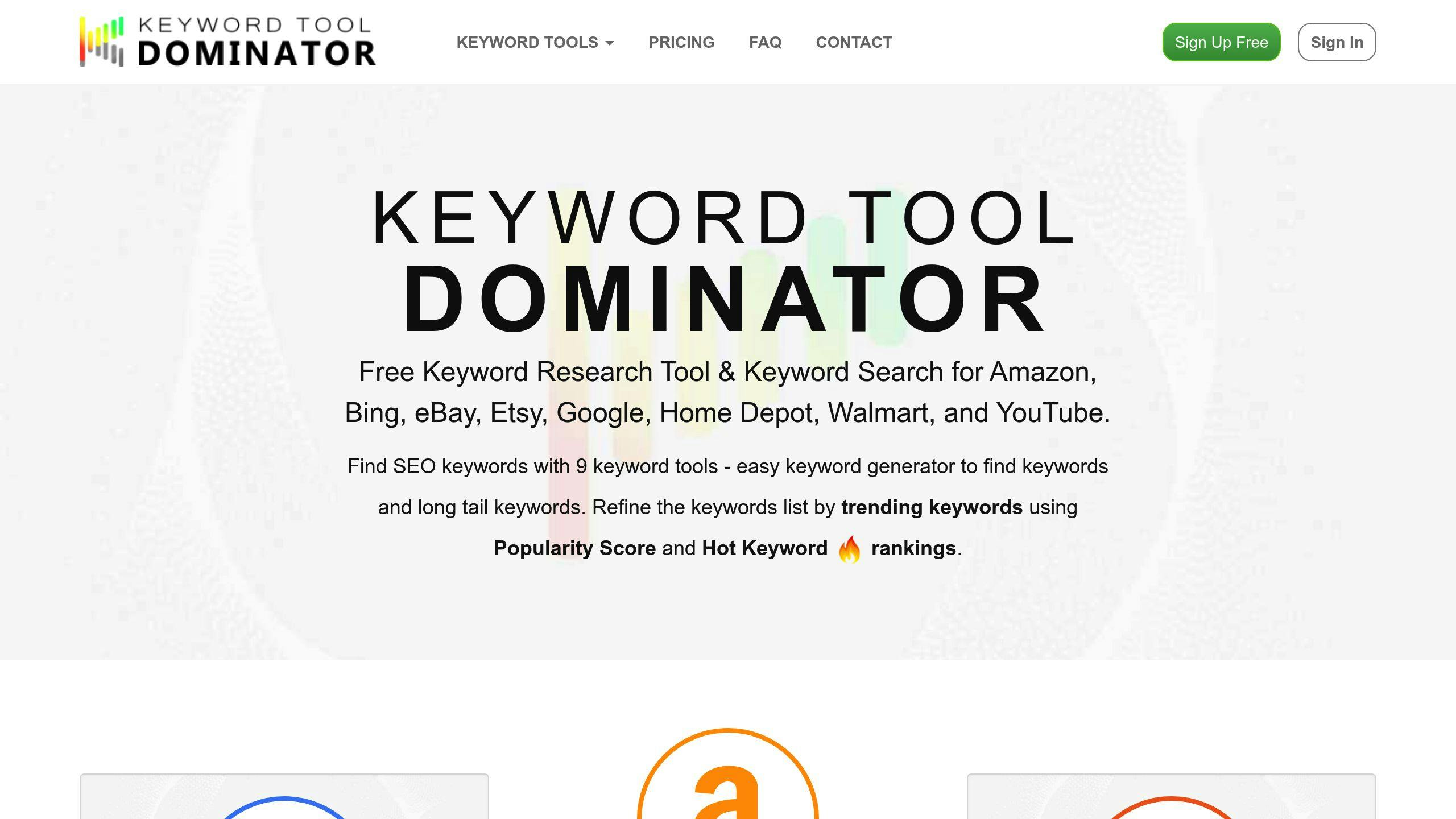
Keyword Tool Dominator is a keyword research tool designed to work across platforms like Google, YouTube, Amazon, and Bing. Unlike Soovle, which offers general multi-platform suggestions, this tool hones in on keywords tailored to each platform's specific needs.
It helps users find less competitive keywords while keeping the process straightforward. Instead of overwhelming you with too much data, it focuses on delivering practical insights.
| Feature | Description |
|---|---|
| Primary Function | Keyword research for multiple search engines |
| Target Audience | Small businesses, content creators |
| Pricing Model | Freemium |
| Key Capabilities | Platform-specific keyword suggestions, SERP insights, long-tail keyword discovery |
| Integration Options | Limited third-party tool compatibility |
The freemium pricing makes it appealing for budget-conscious users like small businesses and content creators. While it doesn’t match the advanced analytics found in tools like SEMrush or Ahrefs, its simplicity is a strength for those who want quick, actionable insights.
"Keyword Tool Dominator's multi-search engine functionality provides a unique advantage for businesses targeting different search platforms simultaneously", says an SEO expert familiar with the tool.
One of its standout features is its ability to uncover long-tail keywords, like "best organic coffee beans for cold brew at home." These are especially useful in niche markets where competing for broader terms is tough. By focusing on these specific opportunities, users can target areas that larger competitors might miss.
This tool prioritizes ease of use over complex analytics, making it a great choice for those who need quick results without diving into detailed SEO metrics. However, its limited integration options mean it’s best used alongside other SEO tools rather than as a standalone solution.
For those looking for an affordable way to start keyword research across multiple platforms, Keyword Tool Dominator strikes a balance between usability and functionality. In the next section, we’ll look at how DataForSEO takes keyword research to the next level with enterprise-grade features for larger organizations.
12. DataForSEO Overview
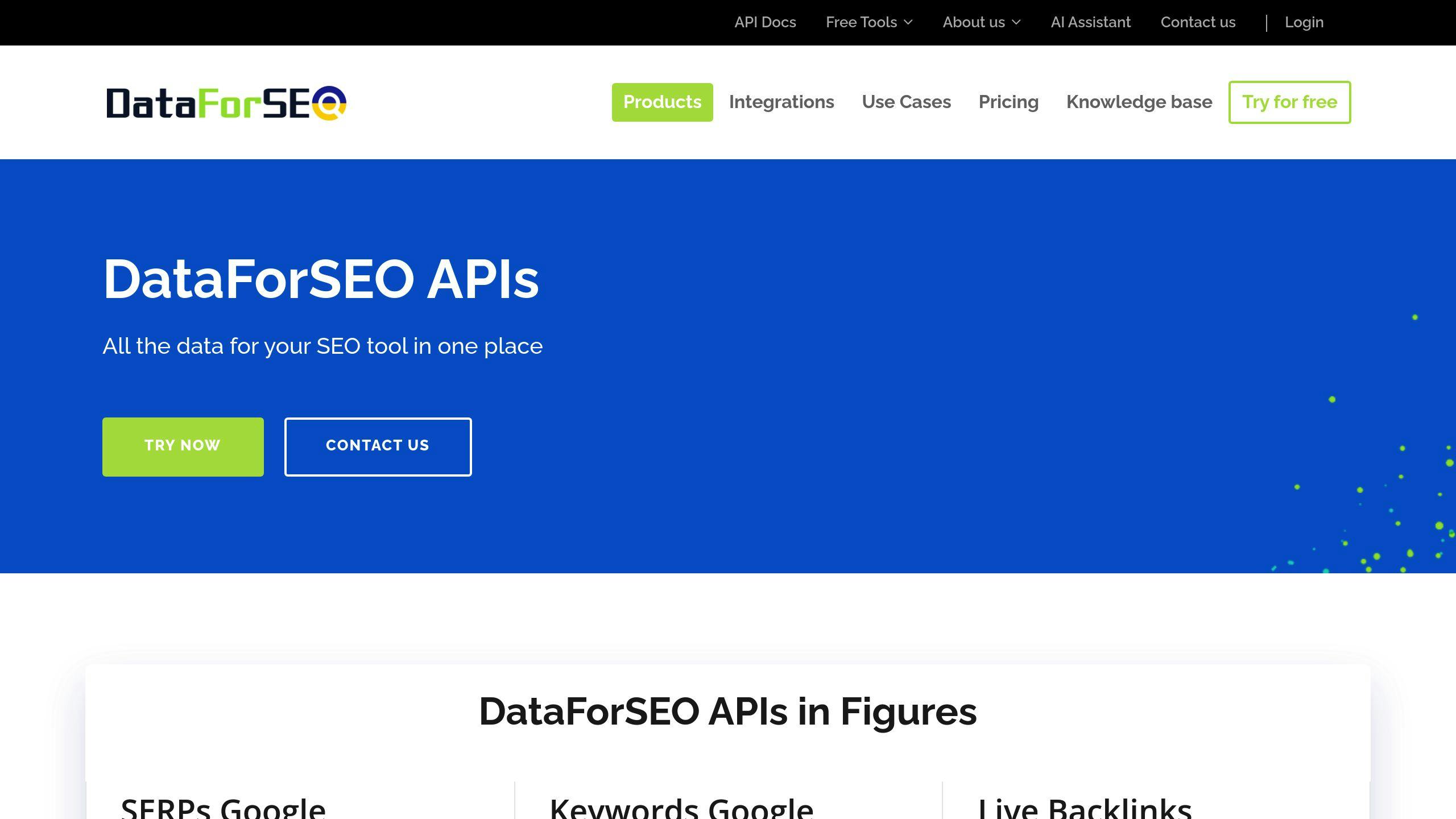
DataForSEO is an API-first keyword research platform designed to integrate directly into your existing workflows. Instead of focusing on user interfaces like traditional tools, it delivers raw data that supports advanced SEO operations.
| Feature | Description |
|---|---|
| Core Functionality | API-driven keyword research and SEO data |
| Target Users | Developers, SEO agencies, enterprise businesses |
| Pricing Model | Pay-as-you-go, based on data usage |
| Data Sources | Google Trends, Keyword Planner, Bing Ads |
| Technical Requirements | Requires API integration expertise |
"DataForSEO's API-first approach enables businesses to automate their SEO processes and integrate keyword data directly into their existing applications, making it a powerful choice for technical teams", says a senior SEO developer familiar with the platform.
What makes DataForSEO stand out is its focus on accuracy and frequent updates. By pulling data from multiple trusted sources, it ensures users have access to the latest keyword trends. This is especially useful for businesses in industries where search trends shift rapidly.
Unlike tools that lock you into fixed subscription plans, DataForSEO offers a pay-as-you-go model. This allows businesses to scale usage based on their needs, making it a great fit for dynamic SEO tasks. It’s particularly effective for handling large-scale keyword research and powering automated workflows. Agencies and enterprises managing high volumes of data rely on its ability to process extensive datasets with precision.
The flexible pricing structure is a big plus for companies seeking specific data without committing to full-scale SEO tool subscriptions. For businesses in need of scalable, tailored SEO solutions, DataForSEO offers a level of adaptability that’s hard to match.
Strengths and Weaknesses of Each Tool
Picking the right keyword research tool comes down to matching its features with your SEO needs and budget. Here's a breakdown of their strengths and limitations to help you decide.
| Tool Category | Tool Name | Key Strengths | Key Limitations | Best For | Starting Price |
|---|---|---|---|---|---|
| Enterprise Solutions | SEMrush | Detailed competitor analysis, large keyword database | Steep learning curve | Enterprise SEO teams | $117.33/month |
| Ahrefs | Excellent backlink analysis, keyword difficulty scores | Higher cost | Professional SEOs | $119/month | |
| DataForSEO | API-focused, flexible pricing options | Requires technical skills | Developers | Pay-as-you-go | |
| Mid-Market Tools | Moz Keyword Explorer | Strong difficulty scoring, SERP insights | Fewer advanced features | Mid-level marketers | Free trial available |
| KWFinder | Simple to use, accurate difficulty scores | Limited advanced options | Budget-conscious marketers | Lower-tier pricing | |
| Keyword Tool Dominator | Supports multiple search engines | Basic capabilities | Local SEO specialists | Mid-tier pricing | |
| Small Business & Beginners | Google Keyword Planner | Direct data from Google | Limited advanced features | PPC advertisers | Free |
| Ubersuggest | Easy-to-navigate interface | Basic functionality | Small businesses | Freemium | |
| Soovle | Suggestions from multiple sources | Minimal features | Quick research | Free | |
| Specialized Tools | Jaaxy | Detailed competition insights | Limited overall features | Affiliate marketers | Premium pricing |
| Topic Ranker | AI-driven recommendations | Basic feature set | Content optimization | Free | |
| Backlinko's Tool | SEMrush integration | Requires SEMrush account | SEO beginners | Free (with limits) |
SEMrush is perfect for competitor analysis, while Ahrefs stands out in backlink research. Both are powerhouse tools for enterprise-level users but may be too complex for beginners.
For smaller teams or those just starting, Ubersuggest and KWFinder offer essential features at affordable prices. Google Keyword Planner is a go-to for PPC advertisers, providing direct insights into search volume trends.
If you need custom solutions, DataForSEO is ideal for developers and technical teams. Meanwhile, Moz Keyword Explorer strikes a balance between advanced tools and simplicity, making it a great fit for growing marketing teams.
Each tool serves a specific purpose, so understanding your goals, technical skills, and budget will help you choose the best fit for your needs.
Final Thoughts
SEMrush and Ahrefs stand out for large-scale SEO campaigns that demand advanced features. Their extensive toolsets justify the higher cost for businesses requiring in-depth keyword analysis and tracking.
Moz Keyword Explorer strikes a balance, offering professional-level features while remaining accessible for growing marketing teams. For smaller businesses or startups, Ubersuggest and Google Keyword Planner are budget-friendly choices. Google Keyword Planner, in particular, shines for optimizing PPC campaigns.
Pairing tools can also boost productivity and results. Here are a few combinations tailored to specific needs:
| User Type | Recommended Tool Combination | Key Benefits |
|---|---|---|
| Small Businesses | Keyword Tool Dominator + Google Keyword Planner | Focused on local search with reliable volume data |
| Technical Teams | DataForSEO + KWFinder | Combines API flexibility with a user-friendly interface |
| Content Marketers | Topic Ranker + Soovle | AI-driven insights paired with multi-source keyword suggestions |
As SEO tools evolve, artificial intelligence is playing a bigger role in keyword research. Platforms like Topic Ranker and SEMrush are changing how we analyze search terms, offering more advanced features while still addressing core business needs.
Choosing the right tool isn’t just about features - it’s about aligning with your team’s skills and workflow. Pick a solution that supports your current goals while also preparing you for future growth.


